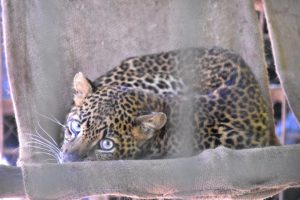Wanicare
Wanicare Foundation is a small Dutch foundation in West Java, Indonesia. Wanicare supports the Cikananga wildlife rescue center. They have developed several programs related to the rescue, preserve and release of wildlife. Willemijn Eggen started the Wanicare foundation in 2009 to support the rescue center Cikananga when the park went through a rough time. Since then, the rescue center has become more organized and they made a big difference in animal welfare. Wanicare takes care of over 350 rescued wild animals, protected and non-protected. Examples are birds, reptiles, primates, Javanese leopards, bears, and many more. There are two main reasons why these animals end up here.
Illegal wildlife trade
Many wild animals came from illegal trade in wildlife. The demand for wildlife worldwide is huge and so is the illegal trade in it. Large, powerful and criminal organizations are the ones who earn big money with this. Mostly, they order local poachers to poach the wild animals. In case with the primates, the mother is shot in order to catch the babies which are more attractive to sell and less dangerous. The animals are then exported to keep them as pets or to be used in the tourism sector and even as medicines.
Deforestation
Another big problem is deforestation. There is only a small area of jungle left on Java and the rest of Indonesia which is getting smaller and smaller. The natural habitat is too small to feed a whole population. The consequence is that many species are threatened with extinction. Another consequence is that in some cases, conflicts arise between animals and humans because wild animals are trying to find food in the villages. This is the problem with the Javan leopard.
Work at the rescue center
Wanicare collaborates with various parties and individuals to track illegal trade in wildlife. When these animals are confiscated, they will be transported to the Cikananga wildlife rescue center or to another rescue center. Wanicare first tests whether animals carry diseases and give medical treatment if necessary. Then, the animals get a place to stay, get daily care and will be observed. In the end, the goal is to release the animals, if possible, back into their natural habitat. But before, Wanicare investigates their natural habitat and the best way to release them again. This is very difficult because it requires a lot of research and some animals haven’t lived in the wild for a long time. When some animals can not be released anymore, Wanicare gives them a lifetime care.
.

Javan Leopard
An important example of a release program is that of the Javan leopard which there are only about 150 left in the wild. Wanicare currently provides six Javan leopards in the park Cikananga. They are currently working to create a program to again release the leopards in the wild. Much research into the best way to release the Javan leopards. They are prepared for eventual release by building a bigger cage in which they are trained to get back into the wild to live.
Opportunities to support Wanicare
Volunteer or do an internship
Are you looking for an internship or voluntary work with wildlife? Wanicare launched a successful volunteer program. You have the opportunity to volunteer for at least a week. You will work with other volunteers and the local staff in the daily care of the animals. In addition, Wanicare offers internships for students from different studies. If you want to have more information, you visit the website of Wanicare.
Visit Wanicare with your school
Would you like to support a charity with your school? You an raise donations with you school and you are able to visit them. Wanicare has several multi-day programs at the Cikananga park for schools that want to support and visit Wanicare.
Donating supplies
There is a great need for supplies to take care of the animals. Especially medical supplies and enrichment for the cages so the animals have something to play. You can find a list op required products on the website of Wanicare.
Donations
Wanicare runs entirely on donations to rescue as many animals as possible. There are donations needed to feed the animals, to set up programs, pay employees, build and renovate cages, purchase items and much more. You can donate both as an individual and as a school or business. Donations can include single donations or monthly donations.
